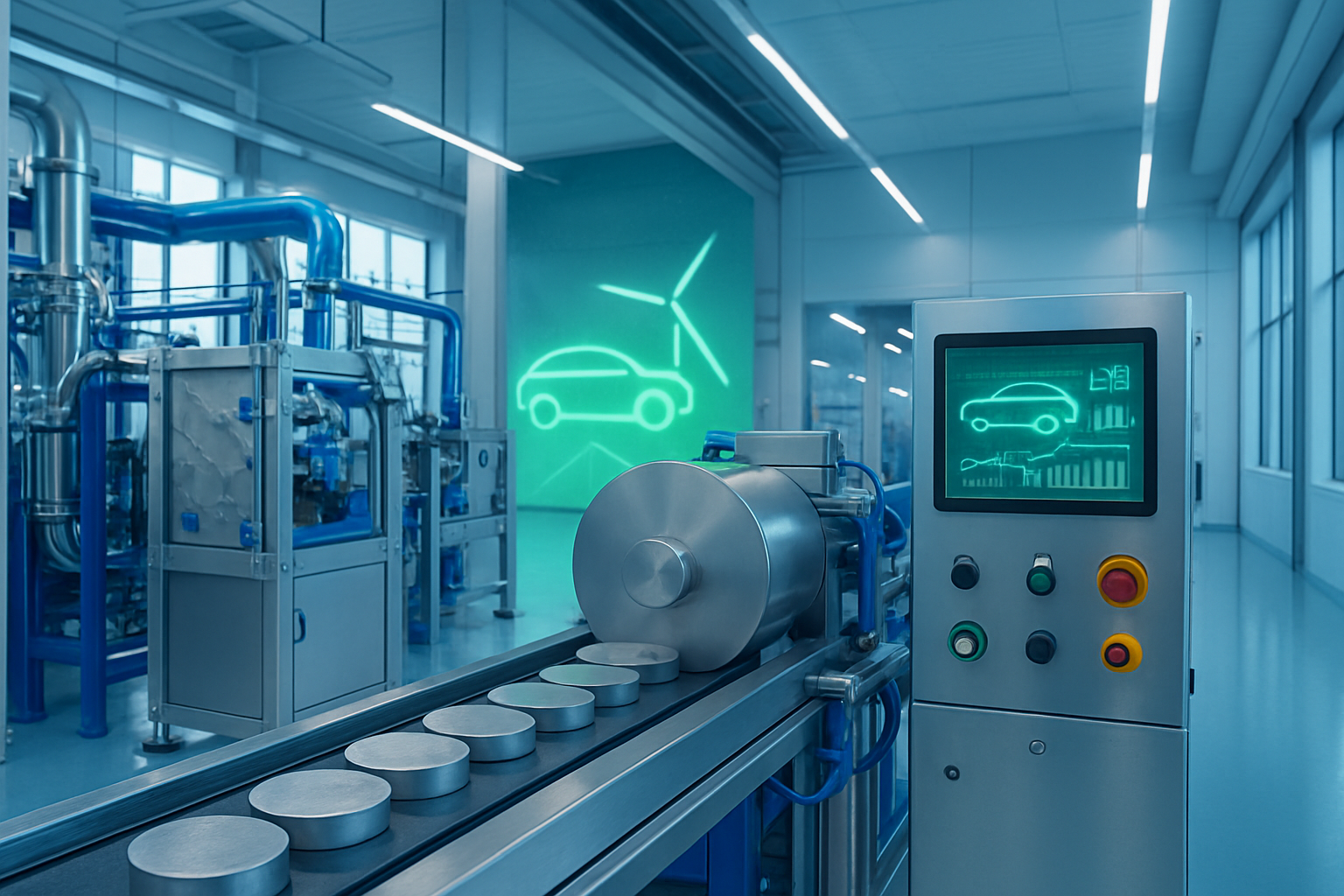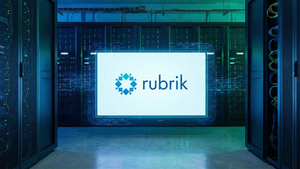Financial News
Europe Forges Ahead in Critical Materials: Neo Performance Materials Powers a New Era of Industrial Independence

Europe is taking a monumental leap towards securing its industrial future and green transition goals with the significant expansion of critical materials production capacity by Neo Performance Materials (TSX: NEO). The recent inauguration of a state-of-the-art permanent magnet manufacturing facility in Narva, Estonia, marks a pivotal moment, signaling Europe's determined push to reduce its reliance on external suppliers for indispensable components vital to electric vehicles, wind turbines, and advanced robotics. This strategic investment not only fortifies European industrial capabilities but also promises to reshape the global supply chain dynamics for rare earth materials.
The new facility is a cornerstone in Europe's broader strategy to build resilient, localized supply chains for critical raw materials. By establishing an integrated, end-to-end rare earth processing and magnet production hub, Neo Performance Materials is directly addressing the continent's vulnerability in sourcing these essential components. This development underscores a significant trend towards re-industrialization and strategic autonomy within Europe, with profound implications for economic growth, technological innovation, and geopolitical influence in the coming decades.
A New Dawn for European Manufacturing: Details of Neo Performance Materials' Strategic Expansion
Neo Performance Materials has cemented its role as a key player in Europe's industrial resurgence with the opening of its permanent magnet factory in Narva, Estonia, in September 2025. This facility is strategically co-located with Neo's existing rare earth separation plant in Sillamäe, creating a unique, vertically integrated operation—the only one of its kind in Europe outside of Asia. The Narva plant is dedicated to producing sintered neodymium-iron-boron (NdFeB) permanent magnets, which are critical for high-efficiency motors in electric vehicles, generators in wind turbines, and various other advanced technologies underpinning the green transition.
The journey to this moment has been a concerted effort to de-risk Europe's supply chains. The rare earth feedstock for the Narva plant is sourced from diverse global locations, including the United States, and then processed into high-purity rare earth oxides at the Sillamäe facility. This integrated approach ensures a secure and traceable supply chain from raw material to finished magnet. The initial production capacity of 2,000 metric tons of magnets per year is substantial, capable of supplying enough magnets for over one million electric vehicles or more than 1,000 offshore wind turbines annually. Plans are already in motion to scale this capacity to over 5,000 metric tons per year in a second phase, potentially supporting the manufacturing of 4.5 million electric cars. The total investment for the Narva factory stands at approximately €75 million, with a significant grant of up to €18.7 million from the EU's Just Transition Fund, highlighting the strategic importance placed on this project by European policymakers. Key stakeholders involved include the Estonian government, the European Union, and major industrial partners such as Schaeffler (ETR: SHA) and Bosch (private), who have already secured contracts with Neo, signaling strong industry confidence and demand. While immediate public market reactions for Neo Performance Materials' stock are typically tied to quarterly earnings and broader market sentiment, the strategic significance of this operational milestone is expected to be viewed positively by investors focused on long-term supply chain resilience and ESG factors.
Reshaping the Competitive Landscape: Winners and Losers in the Critical Materials Sector
The expansion of Neo Performance Materials' (TSX: NEO) production capacity in Europe is poised to create distinct winners and losers across the critical materials and advanced manufacturing sectors, fundamentally reshaping the competitive landscape.
Winners:
- Neo Performance Materials (TSX: NEO): As the operator of Europe's first rare earth permanent magnet manufacturing facility, Neo is positioned for substantial growth. The company gains a significant competitive advantage by offering a localized, secure, and vertically integrated supply chain for essential magnets, attracting European manufacturers keen on reducing supply risks. This strategic move enhances its market share in a high-demand sector and strengthens its financial outlook through long-term contracts with major European industrial players.
- European Automotive and Renewable Energy Manufacturers: Companies like Schaeffler (ETR: SHA), Bosch (private), and major European electric vehicle manufacturers such as Volkswagen (ETR: VOW3) and Mercedes-Benz Group (ETR: MBG), along with wind turbine giants like Siemens Gamesa Renewable Energy (BME: SGRE) and Vestas Wind Systems (CPH: VWS), stand to benefit immensely. Access to a stable, localized supply of high-performance rare earth magnets reduces their dependence on often volatile and geopolitically sensitive Asian supply chains. This ensures greater production security, potentially lower logistics costs, and improved resilience against global disruptions, accelerating their green transition efforts.
- The European Union and Member States: The EU's Critical Raw Material Act targets are directly supported by this expansion, bolstering regional economic development, creating high-tech jobs, and fostering technological innovation. Estonia, in particular, benefits from increased foreign investment and its emergence as a critical hub for advanced materials processing.
Potential Losers (or those facing increased competition):
- Asian Rare Earth Magnet Producers (especially those in China): While global demand for rare earth magnets continues to grow, increased European domestic production will inevitably lead to greater competition for Asian producers, particularly those focused on the European market. Companies like China Northern Rare Earth Group (SHA: 600111) and JL MAG Rare-Earth Co., Ltd. (SHE: 300837) may experience a gradual erosion of their market dominance in Europe as local alternatives become available and preferred by European manufacturers. This doesn't imply a complete loss but rather a shift in market share and increased pressure on pricing and innovation to maintain competitiveness.
- Other Western Rare Earth Developers without Downstream Capacity: Companies focusing solely on rare earth mining or separation without integrated downstream magnet manufacturing capabilities might find themselves at a disadvantage. The trend favors vertical integration and localized supply chains, potentially making it harder for upstream-only players to secure long-term contracts with European end-users who prioritize a fully localized solution.
- Companies reliant on traditional, less resilient supply chains: Any company in Europe that has not actively diversified its critical materials sourcing and remains heavily dependent on single-source or distant suppliers may face increased vulnerability to geopolitical risks, trade disruptions, and price volatility. This event serves as a stark reminder of the imperative for supply chain resilience.
Overall, Neo Performance Materials' expansion reinforces a global trend towards regionalization and diversification of critical material supply chains, challenging the long-standing concentration of production in Asia and ushering in a more competitive and geographically diverse market.
Broader Implications: A Strategic Shift Towards European Industrial Autonomy
The expansion of Neo Performance Materials' (TSX: NEO) critical materials production in Europe is far more than an isolated corporate investment; it represents a profound strategic pivot for the continent, fitting into broader industry trends focused on supply chain resilience, decarbonization, and geopolitical de-risking. This move signifies Europe's unwavering commitment to achieving industrial autonomy in strategically vital sectors.
This event is a direct manifestation of the global push to diversify critical raw material supply chains, which have historically been heavily concentrated in a few regions, primarily China. The COVID-19 pandemic and escalating geopolitical tensions have starkly highlighted the vulnerabilities of such dependencies. Europe, currently importing 98% of its rare earth magnets from China, views this as an untenable risk. Neo's Narva facility directly addresses this, aligning perfectly with the EU's Critical Raw Material Act, which targets increasing domestic processing of critical minerals to 40% by 2030. This initiative will likely spur further investments in mining, refining, and manufacturing across the continent, creating a ripple effect on competitors and partners alike, encouraging them to localize their operations or partner with European entities.
Regulatory and policy implications are significant. The substantial grant from the EU's Just Transition Fund underscores the bloc's commitment to financially supporting projects that enhance strategic autonomy and contribute to green objectives. This kind of state aid, aimed at fostering critical industries, sets a precedent and signals continued policy support for similar ventures. Furthermore, the establishment of an integrated rare earth hub could lead to stricter environmental and labor standards being applied to critical material production within Europe, potentially influencing global best practices and raising the bar for international competitors. Historically, the drive for industrial autonomy in critical sectors has often been a response to perceived national security or economic vulnerabilities. Comparisons can be drawn to the post-World War II efforts to rebuild European heavy industry or the more recent push for semiconductor manufacturing independence in the US and Europe. These historical precedents suggest that once a strategic direction like this is set, it often leads to sustained investment and policy support over decades, fundamentally altering industrial landscapes.
The Road Ahead: Navigating Opportunities and Challenges
The inauguration of Neo Performance Materials' (TSX: NEO) Narva facility sets the stage for a dynamic period in the European critical materials sector, presenting both significant opportunities and formidable challenges in the short and long term.
In the short term (next 1-3 years), the immediate focus will be on ramping up production at the Narva plant to meet initial contractual obligations with key European automotive and renewable energy clients. This period will be crucial for optimizing manufacturing processes, achieving full operational efficiency, and demonstrating the reliability and quality of European-produced rare earth magnets. Success in this phase could rapidly accelerate further investment into the planned second phase of expansion, boosting capacity to over 5,000 metric tons annually. Market opportunities will emerge for ancillary industries, including specialized equipment suppliers, logistics providers, and skilled labor development programs within Estonia and across Europe. Strategic pivots may be required by other European manufacturers to integrate these new domestic supply options into their production lines, potentially shifting away from existing non-European suppliers.
Looking further ahead (3-10+ years), the long-term possibilities are transformative. Neo's integrated hub could serve as a magnet (pun intended) for attracting other high-tech industries to the region, fostering a broader ecosystem for advanced materials and manufacturing. This could lead to the development of new research and development clusters focused on next-generation magnet technologies and rare earth recycling, further solidifying Europe's position as an innovation leader. The primary challenge will be sustaining the competitive advantage against established Asian producers, particularly regarding cost-effectiveness and scale. This will necessitate continuous innovation, efficient resource management, and potentially further government support to level the playing field. Furthermore, securing a diverse and sustainable supply of rare earth feedstocks for the Sillamäe separation plant will remain critical to the long-term viability of the entire integrated operation. Potential scenarios include Europe becoming a significant, albeit not dominant, global player in rare earth magnet production, capable of meeting a substantial portion of its own demand and influencing global market standards.
Securing Europe's Future: A Landmark Moment for Industrial Resilience
Neo Performance Materials' (TSX: NEO) expansion of its critical materials production capacity in Narva, Estonia, represents a landmark achievement in Europe's quest for industrial resilience and strategic autonomy. The inauguration of Europe's first rare earth permanent magnet manufacturing facility is a powerful testament to the continent's commitment to de-risking its supply chains, particularly for materials crucial to the burgeoning electric vehicle and renewable energy sectors. This strategic investment directly addresses Europe's historical over-reliance on external suppliers, primarily from Asia, and aligns perfectly with the ambitious targets set by the EU's Critical Raw Material Act.
Moving forward, the market will closely watch Neo Performance Materials' ability to scale production, secure additional long-term contracts, and maintain cost-effectiveness in a globally competitive landscape. The success of this integrated rare earth processing and magnet manufacturing hub in Estonia will likely serve as a blueprint for future investments in critical raw materials across Europe, encouraging further localization and vertical integration. For investors, this event signals a significant shift towards more resilient and geographically diversified supply chains, making companies like Neo Performance Materials attractive for their strategic importance and alignment with global decarbonization trends. Investors should monitor the company's production ramp-up, new contract announcements, and any further policy support from the EU, as these will be key indicators of the lasting impact and success of this pivotal European industrial endeavor.
This content is intended for informational purposes only and is not financial advice
More News
View More



Recent Quotes
View More
Quotes delayed at least 20 minutes.
By accessing this page, you agree to the Privacy Policy and Terms Of Service.



